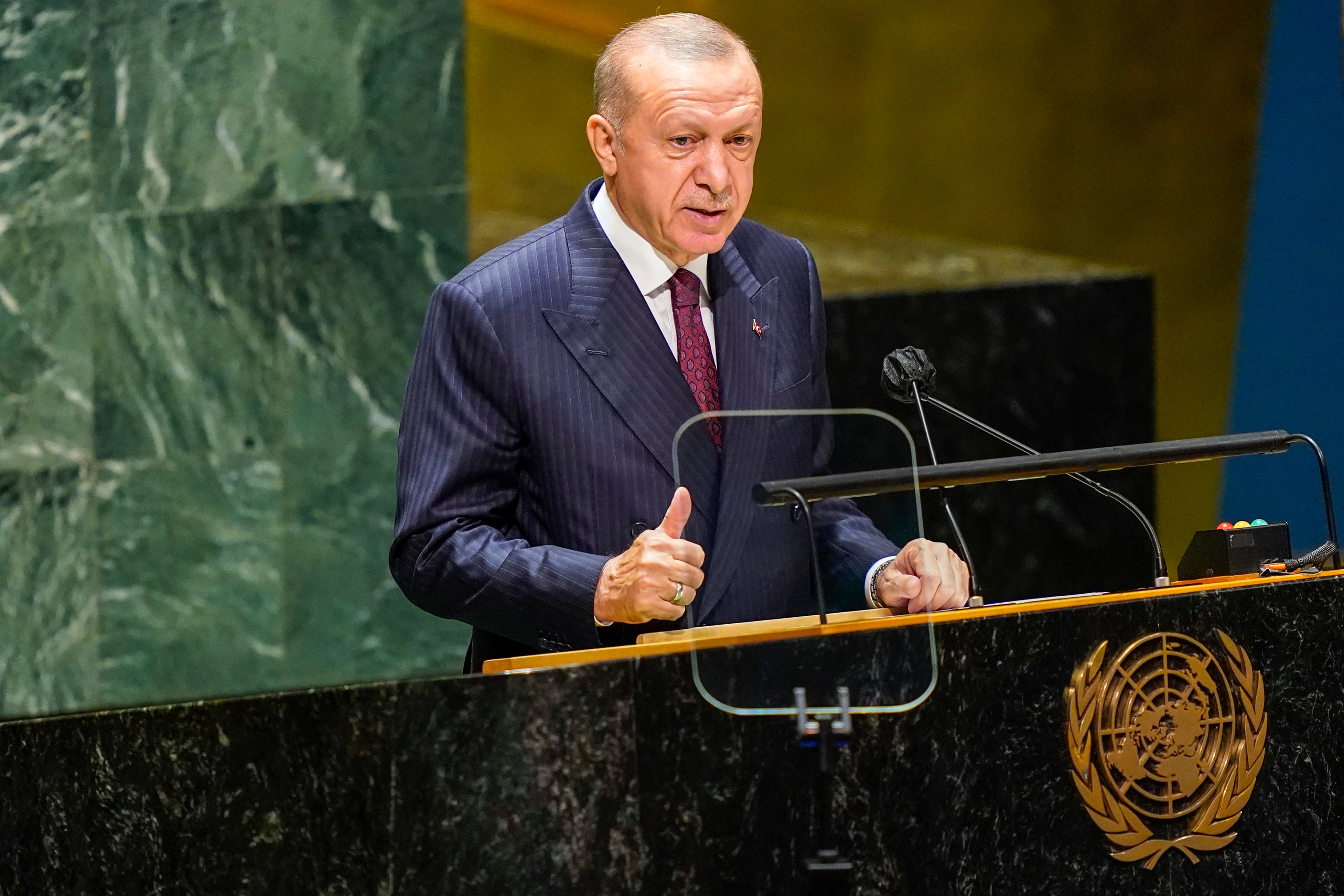Turkey's Erdogan: Refugee crisis from climate change coming
Turkish President Recep Tayyip Erdogan says the world needs to find a way to contend with its existing conflict refugees before it has to grapple with potentially hundreds of millions of climate refugees

Your support helps us to tell the story
From reproductive rights to climate change to Big Tech, The Independent is on the ground when the story is developing. Whether it's investigating the financials of Elon Musk's pro-Trump PAC or producing our latest documentary, 'The A Word', which shines a light on the American women fighting for reproductive rights, we know how important it is to parse out the facts from the messaging.
At such a critical moment in US history, we need reporters on the ground. Your donation allows us to keep sending journalists to speak to both sides of the story.
The Independent is trusted by Americans across the entire political spectrum. And unlike many other quality news outlets, we choose not to lock Americans out of our reporting and analysis with paywalls. We believe quality journalism should be available to everyone, paid for by those who can afford it.
Your support makes all the difference.Presaging “hundreds of millions” of climate change refugees, Turkey s president said Tuesday at the U.N. General Assembly that the world needs to find a way to contend with its existing refugees who are fleeing conflict.
Recep Tayyip Erdogan has warned that Turkey, which he says “embraces close to four million Syrians ” cannot take in any more migrants. He reiterated that sentiment in the context of Afghanistan telling delegates it was time for all stakeholders to share responsibility.
“As a country that saved human dignity in the Syrian crisis, we no longer have the potential nor the tolerance to absorb new immigration waves,” Erdogan said.
Without elaborating, he promised Turkey would fulfill its “fraternal duty” to Afghanistan and called upon the international community to present help and solidarity.
Erdogan returned to the concept of displacement throughout his nearly half-hour speech. Turkey, which is scheduled to hold presidential elections in 2023, is currently experiencing a tide of anti-migrant sentiment as its economy struggles.
“In many places, people are collectively preparing to go to other places, to migrate,” Erdogan said. “The world has still not found a solution to the refugee problem caused by conflict-prone crisis regions such as Syria and Afghanistan.”
He cited moves from the first lady's recycling project to increased forest assets and announced Turkey would finally submit the 2015 Paris climate agreement to its parliament for ratification next month, just before the Glasgow conference. Turkey, which wants to be reclassified as a developing instead of developed country to avoid harsher climate targets, had been among a handful of holdouts.
Erdogan aimed to contrast Turkey's steps with those of larger countries — exhorting “whoever has done the most damage” to contribute the most to the fight against climate change — but has come under criticism in Turkey for his own approaches to the problem. The leader of Turkey's main opposition party accused Erdogan of ignoring warnings about global warming after deadly wildfires ravaged the south this summer.
He gave brief mention to two issues of territorial sovereignty Turkey has played a role in: Nagorno-Karabakh and Cyprus.
Erdogan celebrated Azerbaijan's reclamation of control over most of Nagorno-Karabakh from Armenia following a weekslong war last year, saying it “enabled the opening of new windows of opportunity in the region for lasting peace.” Turkey and Azerbaijan have long enjoyed mutual affinity, just as Turkey and Armenia have long held mutual enmity. The Turkish government supported Azerbaijan in the flareup.
Cyprus, meanwhile, is ethnically divided between the internationally recognized Greek Cypriot south and the Turkish Cypriot north, which only Turkey recognizes as an independent state. Erdogan called each half “co-owners of the island,” but decried how the Turkish Cypriot leader was denied a platform at the General Assembly.
Erdogan reiterated his push for multilateralism, invoking the name of his recently published book “A Fairer World is Possible” toward the idea of strengthening the General Assembly and tempering the power of the five permanent U.N. Security Council members.
He touted the Turkevi Center, a newly built New York skyscraper across from the U.N. that houses Turkey's diplomatic mission and consulate, as a sign of Turkey's commitment to the international body.
___
Associated Press reporter Andrew Wilks contributed from Istanbul. Follow Mallika Sen on Twitter at http://twitter.com/mallikavsen.
Subscribe to Independent Premium to bookmark this article
Want to bookmark your favourite articles and stories to read or reference later? Start your Independent Premium subscription today.